The launch begins with four cores
Intel begin the launch of their Ivy Bridge processors in the third generations Core family, with quad-core processors as far as the eye can see. We haven’t been able to get any clarity to the reason of this, rumors say there are problems in the manufacturing, but in that case we find it very odd that they can launch the bigger circuits prior to the smaller with only two cores.
The rumor that we can find more likely is simply that Intel has too big stocks of their dual-core Sandy Bridge processors, which is much more plausible. Therefore they have chosen to delay the launch to get a chance to empty their stocks, which is beneficial for both Intel but also the manufacturers. There is a small exception though, which is something that we will cover further down the page.
One mobile processor stands out
What this has done is that there won’t be any launch in full scale on the mobile side, we just have to be happy with new chipsets and some new quad-core processors.
Core i7-3612QM stands out from the crowd and despite its four cores it gets a TDP value at only 35W. 35W is pretty much an established standard, which mean that we should be able to get much higher performance than before, in a thinner formfactor.
Intel ships the best that they has to offer seen to integrated graphics on the mobile side this generation, just like the previous. We have yet to see anything that point towards that HD 2500 will find its way into any form of processor for laptops, and we do not think that it is likely. So if you’re looking to use their integrated HD 4000 graphics, you should not have to look to hard to see if the computer that you have chosen to buy, has a processor with this particular integrated graphics.
13 quad-core processors for desktops, 1 dual-core
Intel goes big, and plan to quickly replace Sandy Bridge with their new processors built on the very fresh 22 nanometer technology. They begin in the upper segment with the Core i7 and Core i5 processors where all are quad-core processors, with one small exception.
Above we can see all the models that are being announced today, the dual-core models will arrive a little later, like we said. The only exception is the model Core i5-3470T which get two cores at 2,9 – 3,5 GHz with the multi-threading technology Hyper-threading and a TDP value at 35W. Although it has to settle for the company’s HD 2500 graphics, which should place itself just below HD 3000 in terms of performance.
The new top models is Core i7-3770K and Core i5-3570K, and as the K suffix implies arrives with unlocked multipliers for overclocking. Both comes with a TDP value at 77W, and should therefore be more power efficient than the Core i7-2700K and the Core i5-2550K which they replace. We can also see the HD 4000 graphics on both, while the Core i7 models has Hyper-threading and 8 MB L3 cache memory as usual. We have compiled a small checklist on what differs between the Core i7 and the Core i5 below:
| Model name | Core i7 | Core i5 |
| Cores | 4 | 4* |
| Threads | 8 | 4 |
| L3 cache memory | 8 MB | 6 MB* |
| Graphics | HD 4000 | HD 2500** |
| No suffix | 77W TDP | |
| Suffix “K” | 77W TDP, unlocked multipliers for overclocking | |
| Suffix “S” | 65W TDP | |
| Suffix “T” | 45W TDP* | |
*Exception: Core i5-3470T has two cores, Hyper-threading, 3 MB L3 cache memory and a 35W TDP value
**Exception: Core i5-3570K with HD 4000
As you can see in the tables above the support for some security features and the virtualisation instructions VT-d differs quite alot between the different models. We had hoped that Intel would begin to use more logical product names, sadly that’s not the case. We can hope that the fragmentation won’t be so obvious further into the future when it’s time to release newer models on the market.


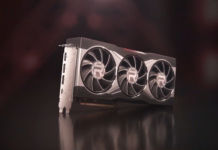








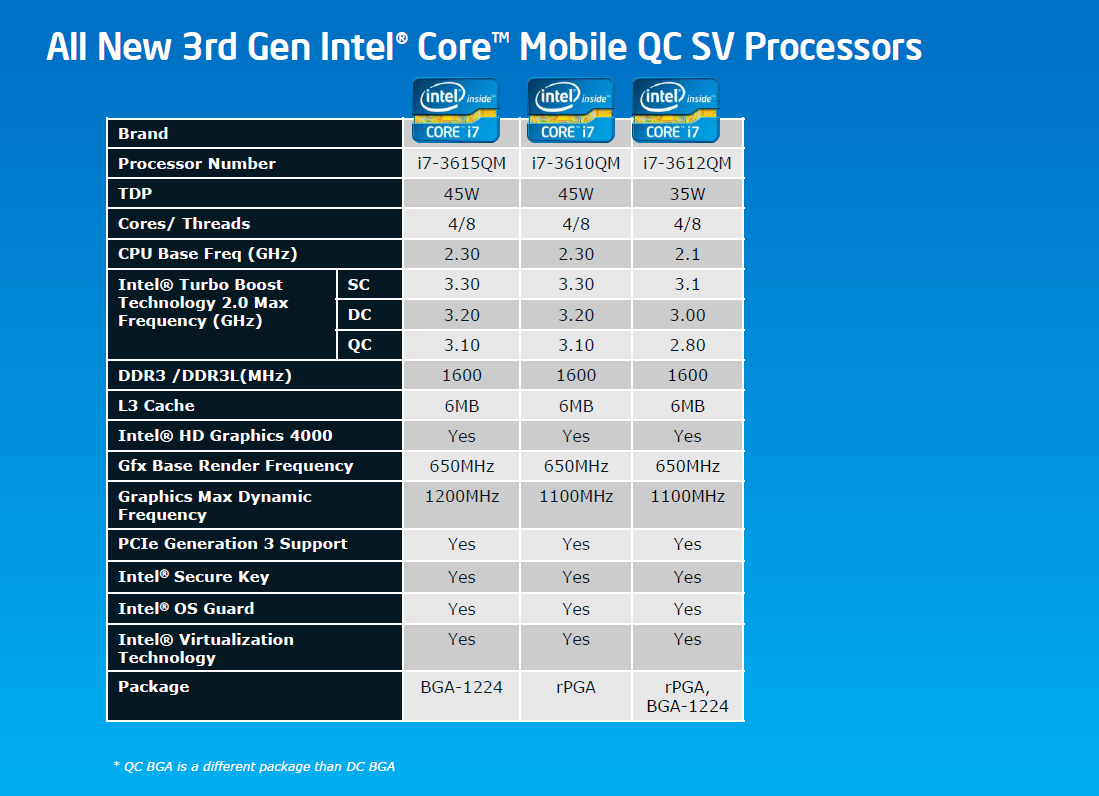

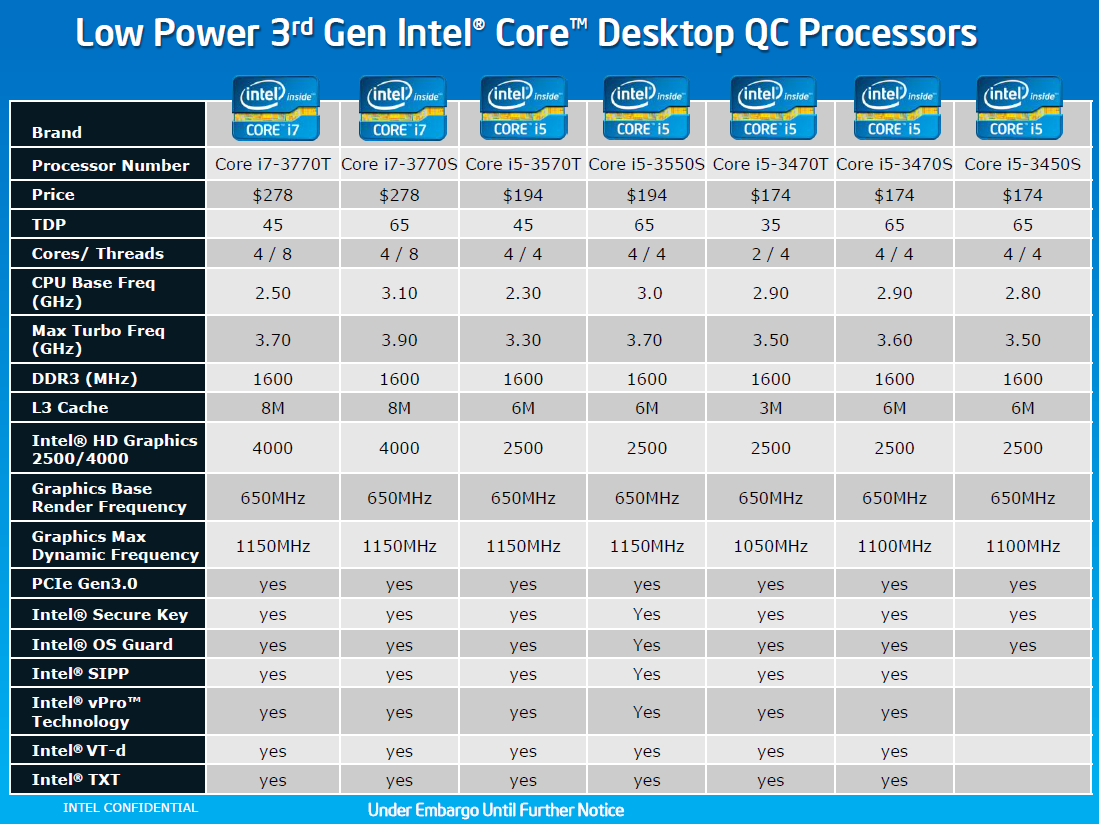
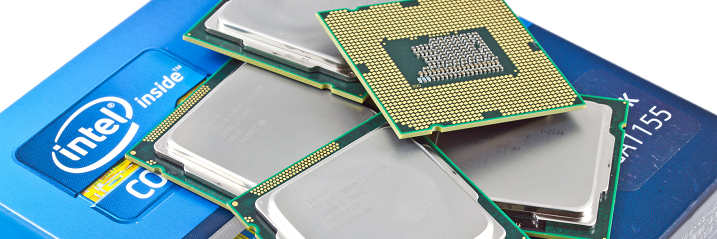

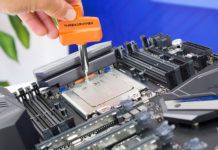





Great review guys, i would really love to see you do much more of them =]
A really great review, good job. Waiting to get my hands on it… but don’t know when it will arrive in Brazil
Glad you liked it
We hope the new translators will have time for more of these.
You used DDR3-1333 for AMD APU when it’s known that those processors need faster RAM to reach top performance, unlike Intel’s which don’t scale up accordingly. As it is, this is a very Intel-biased review.
[quote name=”Taki R”]You used DDR3-1333 for AMD APU when it’s known that those processors need faster RAM to reach top performance, unlike Intel’s which don’t scale up accordingly. As it is, this is a very Intel-biased review.[/quote]If you’re talking about CPU performance, the difference is very much negligible. I can agree however if we’re talking GPU-performance, where may I add, even Ivy Bridge HD 4000 benefits from higher RAM-clocks as well so it’s pretty much apples-to-apples in that regard. We will be revising our testing methodology during the summer, so we’ll be taking all of these things into close consideration… Läs hela »
It seem Intel will beat AMD more with this line of new generation processor. It is faster and consume less power than sandy bridge and trinity. Core per core / clock per clock basis.
I really like to know though the performance and efficiency compare to AMD trinity.
É realmente incrível todo esse progresso/evolução da INTEL.
BRASIL – CRATO – CEARÁ
É realmente incrível todo esse progresso/evolução da INTEL.
BRASIL – CRATO – CEARÁ
What happens if I put a 125w TDP CPU on a 95w motherboard? If I have a quad-core CPU and disable 2 cores will my CPU fit in the 95w TDP?